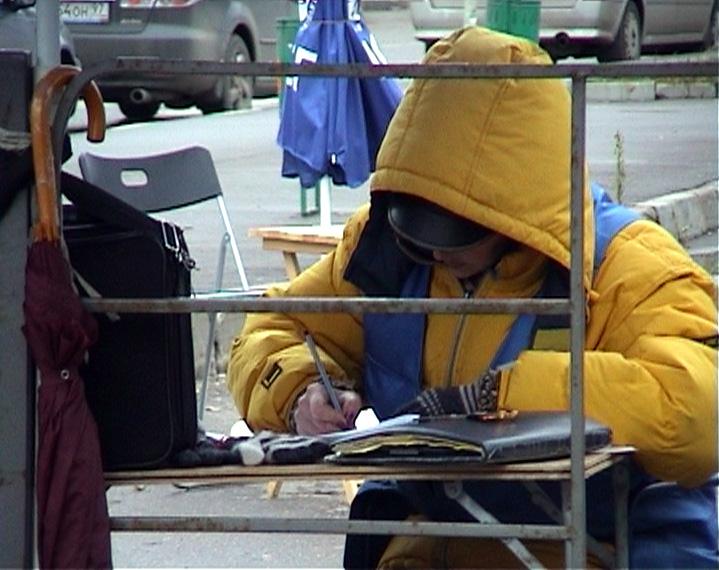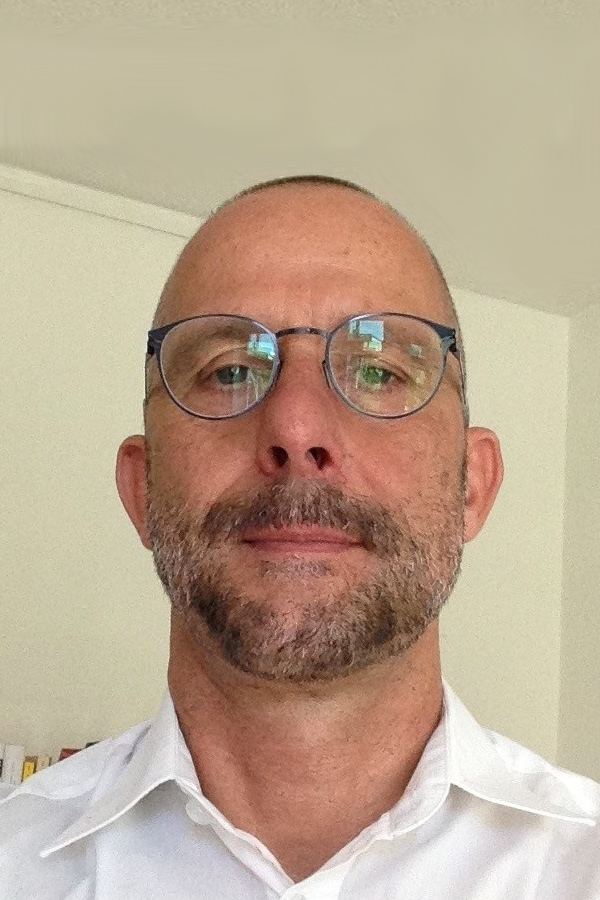An Interview With Clemens von Wedemeyer on the filming of “Otjezd”
Sven Spieker: How did “Otjezd” evolve as a film?
Clemens von Wedemeyer: I was invited in the end of 2004 to take part in the first Moscow Biennial. They asked me to take a look at the city beforehand and to maybe produce something there that could then be shown as part of the exhibition. I was reading a lot before in Berlin about Mayakovsky and other writers that interested me and started to look again at some of the Russian and Soviet films I like. When I went to Moscow in November 2004, people told me it would be cold and pretty expensive and that if I didn’t speak Russian it would be complicated to make a film there. So I was there for a week and actually looked for locations for possible street scenes that I could then remake in Berlin. I went through the city and filmed certain streets and the markets and then suddenly, in front of the German consulate, which is just beside the Goethe Institute, I found a scene that I thought I could redo in Berlin. I myself had to go to the Russian embassy to get a visa in Berlin, and everybody had told me about the difficulties involved. So I knew the situation. I took notes and recorded people’s voices in the line that stood in front of the consulate. Back in Berlin I transcribedthese recordings.
S.S.: One of the things that struck me about Otjezd is that it’s a film not just about Moscow but about Berlin and Moscow. It’s a film about a relationship between two places rather than being a film about one place. I was wondering if you could say if this was of importance to you. You mentioned that the idea of shooting the film in Berlin rather than Moscow came to you while you were in Moscow.
v.W.: The idea was to show the film first at the Moscow Biennial. I was not quite sure what the impact of this first Biennial might be, or its political message, or what the exact idea of the curators was at the end. Another thing was that I had just arrived in Berlin after finishing my studies in Leipzig and I really wanted to do something in Berlin and tell something about Berlin as a city that changed a lot in the last fifteen years, and during this project to focus on the Russian community. It’s not really a community but the Russian immigrants are very important for Berlin and there are a lot of things going on in this community. Maybe as a German I can tell more about the city in which I live [Berlin] but I do not know so much about Moscow. So then I thought that maybe I could tell something about the policies of getting visas, criticizing the German attitude… And maybe by the same token I could say something about the Russian emigrants, those who leave Russia because to leave your country can be a political act. Some of our actors told me that they were not quite sure how our film would be seen in Moscow because the people who leave Russia are not considered patriots. Though maybe they still are because some keep their Russian heritage alive in Berlin, at least some of them…
S.S.: I’m interested in some aspects of the script and the dialogue in “Otjezd.” You told me that you don’t speak Russian, so I wonder if you could tell me a little bit about how you worked with the different languages involved. Your actors were all Russians, I believe. To what extent was the script for the film pre-planned and to what extent did you improvise? How did you deal with the problem of not being able to understand what the actors say in the film?
v.W.: The simple plot is based on my own experience. I myself had to leave my bag somewhere when I wanted to get a visa at the Russian embassy in Berlin. So I just took this plot line and added the character of the girl who has to leave her bag somewhere. That’s the action inside a potpourri of different things. There were also the stories people told me in Moscow and on Berlin and the recordings I made in front of the German consulate in Moscow. I inserted the transcripts of these conversations directly into the script and I rewrote some of the forms that you have to fill in for getting a visa. I then distributed these things to the actors so that each actor would have a text with a different origin. On this basis the actors could start to interpret their lines and get involved. During the shooting I didn’t know exactly what they were saying because I don’t speak Russian; but. all the actors also spoke German, so we could communicate, even though they acted in Russian. To me, the fact that I did not understand the actors was a form of liberation. I didn’t have to understand, I just had to take care of the mise-en-scène, the camera movement, the frame, and the intensity or attitude with which they would speak.
S.S.: This seems to me to be one of the more fascinating aspects of the project. Just to recap, you had recordings done of what people said who stood in line in front of the German embassy in Moscow. These Russian transcripts then had to be translated in order for you to understand them. Then they were given to the Russian actors living in Germany. Additionally, as they acted in the film they would fill in certain gaps or play with the text and make up things themselves. What is fascinating here is that fact that you completely gave up control over what happened in your own film. This reminds me of Tarkovsky who also did not force the actors in his films to simply repeat the lines, giving them a great deal of latitude and freedom to interpret their roles the way they wanted to, as long as they followed Tarkovsky’s general ideas.
v.W.: I was lucky to meet people in Berlin who took on this film as if it was their own story, especially Victor Choulman. Choulman is a theater director in Moscow who lives in Berlin now and who knows a lot about Mayakovsky. He helped with translation issues and he also helped to find other actors. He came to Berlin in the 1990’s. I think that “Otjezd” is about borders, though not only in the sense you mentioned: Real borders, such as the border inside cities like Moscow where you have a German embassy, which acts like a border between two different states. It’s also about the border between reality and fiction.
S.S.: “Otjezd” was filmed in a single-shot, reminding us of recent films such as Sokurov’s “Russian Ark.” How important was this technique for you? Are you passing a comment on montage cinema? How did you decide that this is how the film would be made?
V.W.: I’ve always wanted to do a single-shot short film and this project gave me the opportunity to do it. I’ve been interested in Eisenshteinian montage for a while. I have always asked myself why Tarkovsky developed this way of single-shot filming. Also people like Bela Tarr or Sokurov in the 1990’s, especially directors from Eastern Europe. Why is it that to us the single-shot technique seems so typically Eastern European? Maybe it’s like that only for me. My sense is that something important happened between the technique of montage developed by Eisenshtein, on the one hand, and Tarkovsky’s long traveling shots, on the other. I still don’t have an answer to what that might be but I’m very much interested in the development of editing during these years, not only in the Soviet Union. With “Otjezd” I wanted to create an image of Russia and of Berlin, the idea being that you would not know exactly where the movie was filmed. There is a cinematographic landscape that you can recreate by using certain camera techniques, or by manipulating the sound atmosphere. In “Otjezd,” this landscape maybe reminds us of Russia or of Eastern Europe.
S.S.: “Otjezd” reminds me of photographs by Thomas Demand who builds the absolutely realistic sets for his photographs out of cardboard. In your film you create a similar type of impression, this complete sense one has of being in Russia while in fact the film was shot in the Pankow in Berlin. “Otjezd” deals with our expectation that a film, especially one that comes along like a documentary, supplies us with a trace of reality.
V.W.: Nowadays a lot of productions use Berlin as a set. Some Hollywood and Hong Kong movies are filmed in Berlin because inside the city you find a lot of different kind of scenery and it is not too expensive to rent a studio here. This is what I was thinking of when I picked Berlin as a film studio for Moscow. In East-Berlin you find a lot of scenery that looks like Moscow. Maybe I thought it was too expensive to film in Moscow, or too complicated, or too cold, and so I used Berlin.
S.S.: “Otjezd” functions as a loop. Why did you set it up in this way?
V.W.: I set up films in this way so that in an exhibition people can step into the scenery at any time they want, so they don’t have to wait for the beginning of the film. Besides, I wanted to create something that goes on forever. My protagonists are caught in an in-between-space.






